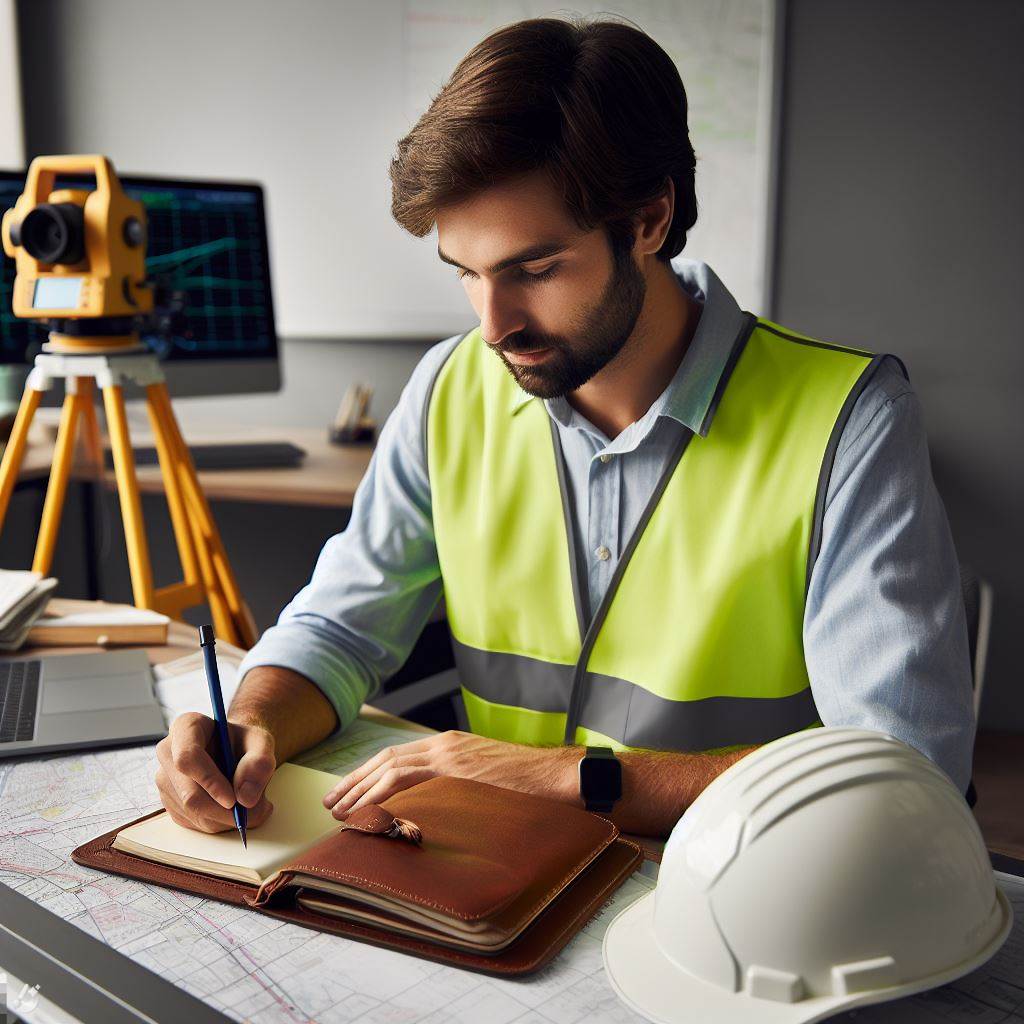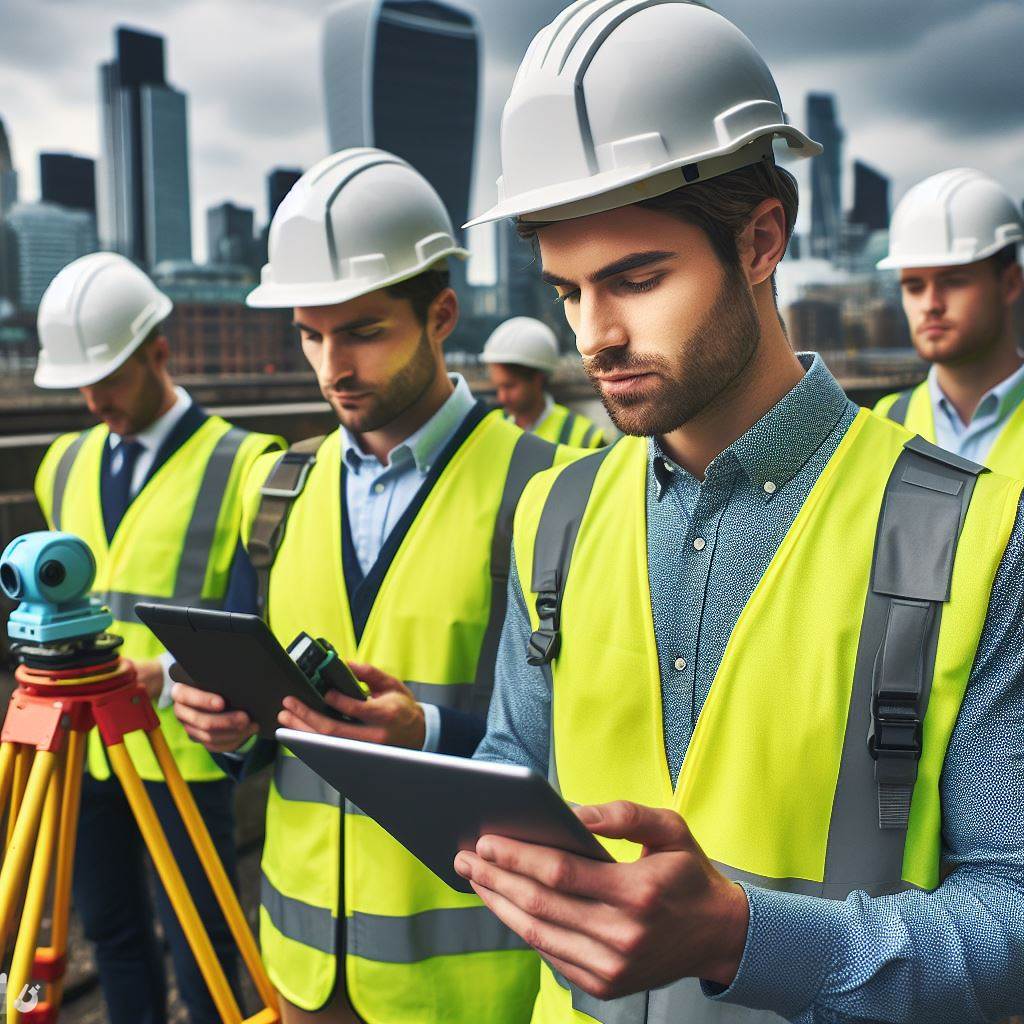Introduction
A. Definition of Surveying
Surveying, the precise measurement and mapping of our environment, underpins critical decisions across diverse industries.
B. Importance of Surveying in Various Industries
- Construction: Ensures accurate site planning and adherence to specifications.
- Real Estate: Facilitates precise land boundaries and property valuation.
- Infrastructure: Guides the development of roads, utilities, and public works projects.
C. Current State of Surveying in the United Kingdom
Surveying in the UK stands at the forefront of technological advancements, integrating drones, LiDAR, and GIS technologies.
This section explores the evolving landscape, anticipating the trajectory of surveying in this dynamic and vital field.
Evolution of Surveying Techniques in the UK
A. Historical background and traditional surveying methods
- Surveying has been an essential practice in the United Kingdom for centuries.
- Early surveyors used basic tools like chains and compasses to measure land.
- These traditional techniques required manual calculations and were time-consuming.
- Despite their limitations, traditional surveying methods were accurate and widely used.
B. Introduction of modern technologies and their impact on surveying
- GPS technology revolutionized the field of surveying in the UK.
- GPS receivers use satellite signals to determine precise locations and provide accurate measurements.
- This technology enabled surveyors to work faster and with greater precision.
- Another significant advancement is laser scanning, commonly used in topographic surveys.
- Laser scanners emit pulses of light to create highly detailed 3D models of the surveyed area.
- Laser scanning eliminates the need for manual measurements and allows for quicker data collection.
- Geographic Information System (GIS) has also been integrated into surveying practices.
- GIS combines spatial data with software tools to analyze and visualize information effectively.
- This technology enables surveyors to manage and interpret vast amounts of data efficiently.
C. Benefits and challenges associated with the adoption of new surveying techniques
- The adoption of modern surveying techniques offers numerous benefits.
- Improved accuracy and efficiency result in cost savings and faster project completion.
- Modern technologies also enhance safety for surveyors by reducing their exposure to hazardous conditions.
- However, the adoption of new techniques comes with its own set of challenges.
- Surveyors need to upgrade their skills to operate and interpret data from advanced instruments.
- The initial investment in modern technology can be substantial for smaller surveying firms.
- There is a risk of over-reliance on technology, potentially neglecting traditional surveying knowledge.
- Furthermore, data security and privacy concerns may arise with the use of GIS technology.
In fact, surveying techniques in the United Kingdom have evolved significantly over time.
From the use of basic tools to the introduction of modern technologies, surveyors can now work more efficiently and accurately.
GPS technology, laser scanning, and GIS have revolutionized the field, offering numerous benefits such as increased speed, improved accuracy, and enhanced data analysis.
However, the adoption of new techniques requires surveyors to upgrade their skills and face challenges such as initial investment costs and potential over-reliance on technology.
Despite these challenges, the future of surveying in the UK looks promising with continuous advancements in technology and its integration into surveying practices.
Read: How to Become an Electrical Engineer in UK
Current Applications of Surveying in the UK
Surveying plays a crucial role in various industries in the United Kingdom.
Let’s explore some of the current applications of surveying:
A. Construction industry
In the construction industry, surveying is essential for accurate site preparation and land surveying.
Surveyors use specialized equipment to measure land features and collect data on elevation, coordinates, and boundaries.
This information helps architects, engineers, and construction teams plan and execute construction projects effectively.
It ensures that structures are built on solid ground and comply with legal and safety requirements.
Site surveys also assist in identifying any potential challenges or risks.
Furthermore, the construction industry has embraced Building Information Modeling (BIM), which relies heavily on surveying data.
BIM allows for the creation of digital representations of buildings, infrastructure, and utilities.
Surveyors use high-precision instruments to capture 3D spatial data, which is then integrated into the BIM software.
This enables better collaboration among stakeholders, reduces errors, and improves project efficiency.
B. Real estate sector
The real estate sector heavily relies on surveying services to ensure accurate property boundaries and valuation assessments.
Property boundary surveys define property lines, which are crucial for resolving disputes and legal issues.
Surveyors accurately measure and map out property boundaries, preventing conflicts between neighbors.
Valuation surveys are important for property transactions and mortgage applications.
Surveyors provide detailed reports on property conditions, including defects, structural integrity, and potential valuation factors.
These surveys help buyers and lenders make informed decisions and assess the market value of properties.
C. Infrastructure development
Surveying plays a vital role in infrastructure development, particularly in transportation network planning.
Surveyors collect data on existing highways, railways, and waterways, facilitating the design and construction of new transport systems or improvements to existing infrastructure.
Accurate topographic surveys enable engineers to plan optimal routes, ensure proper alignment, and minimize environmental impacts.
Environmental impact assessments are another critical aspect of infrastructure development.
Surveyors analyze the potential effects of proposed projects on the environment, including ecosystems, wildlife habitats, and natural resources.
Through accurate surveys and data analysis, surveyors help identify and mitigate potential environmental risks and ensure compliance with regulations.
D. Other industries utilizing surveying services
Besides the aforementioned industries, surveying finds applications in various other sectors, including archaeology and heritage conservation.
Surveyors use advanced techniques to map archaeological sites and historic structures, preserving valuable heritage for future generations.
Mining and resource exploration industries heavily rely on surveying for assessing mineral deposits and underground resources.
Surveyors use specialized equipment to conduct geospatial surveys, providing valuable data for resource extraction and environmental management.
In short, surveying has diverse applications in the UK.
From the construction and real estate sectors to infrastructure development and other industries, surveying plays a crucial role in accurate measurements, planning, and assessing environmental impacts.
As technology continues to advance, surveying techniques and equipment will undoubtedly evolve, further enhancing the future of surveying in the United Kingdom.
Personalized UK Career Consulting
Receive tailored career guidance designed just for you. Get actionable steps and expert support to boost your career in 1-3 days. Take control of your career now.
Get StartedRead: Qualifying as a Mech Engineer in the UK

Factors Influencing the Future of Surveying in the UK
In the United Kingdom, the future of surveying is influenced by various factors encompassing technological advancements, changing legislation, and environmental concerns.
These factors, among others, shape the way surveyors operate and provide essential services in the field.
A. Technological advancements and automation
With the rapid advancement of technology, surveying in the UK is experiencing a significant transformation.
The integration of robotics and drones has revolutionized traditional surveying methods.
These advanced tools allow surveyors to collect data quickly and accurately, saving time and effort.
The use of robotics and drones in surveying enables surveyors to access hard-to-reach areas and obtain precise measurements with minimal human intervention.
As a result, surveyors can now gather comprehensive data more efficiently, contributing to improved project outcomes.
Additionally, cloud computing and data analysis have become integral components of surveying practices.
The ability to store and process large amounts of data in the cloud enables surveyors to streamline their workflows and manage information effectively.
With cloud-based solutions, surveyors can access data from anywhere, collaborate with ease, and make informed decisions promptly.
Furthermore, data analysis tools facilitate the extraction of valuable insights, aiding in the interpretation of survey data and enhancing project outcomes.
B. Changing legislation and regulatory frameworks
The surveying industry operates within a framework of legislation and regulatory requirements that are subject to constant change.
Land surveying regulations are updated to address technological advancements and maintain quality standards.
These regulations ensure that surveyors adhere to ethical practices, maintain professionalism, and provide accurate and reliable survey data.
By complying with these regulations, surveyors establish trust and credibility with clients and the public.
Data privacy and security laws also play a crucial role in shaping the future of surveying in the UK.
As the industry increasingly relies on digital data and technology, protecting sensitive information becomes paramount.
Surveyors must abide by data protection regulations to ensure the secure handling and storage of client data.
Compliance with data privacy and security laws builds trust and safeguards the interests of both surveyors and their clients.
C. Environmental concerns and sustainability requirements
Environmental concerns and sustainability requirements are becoming increasingly important in surveying practices.
Surveyors in the UK are actively involved in green infrastructure planning and assessment.
With the growing emphasis on sustainability, surveyors play a crucial role in managing land use, ensuring environmental impact assessments are conducted, and incorporating sustainable design principles into projects.
By considering environmental factors, surveyors contribute to the creation of sustainable and resilient infrastructure.
Furthermore, surveyors are also engaged in climate change adaptation strategies.
As the effects of climate change become more prominent, surveyors are involved in assessing and mitigating risks associated with rising sea levels, extreme weather events, and other climate-related challenges.
By incorporating climate change considerations into surveying practices, surveyors contribute to the development of adaptive and resilient infrastructure, safeguarding against future climate impacts.
In essence, the future of surveying in the UK is shaped by various factors, including technological advancements, changing legislation, and environmental concerns.
Robotics, drones, cloud computing, and data analysis are transforming traditional surveying practices, enabling surveyors to collect and analyze data more efficiently.
Changes in legislation and regulatory frameworks ensure the highest standards of professionalism and data protection.
Additionally, surveyors are actively involved in green infrastructure planning, sustainability assessments, and climate change adaptation strategies.
By considering these factors, surveyors contribute to the development of a more robust and sustainable built environment in the United Kingdom.
Read: Famous UK Civil Engineers & Their Legacy
Future Opportunities and Challenges for Surveying Professionals
A. Emerging Trends and New Job Roles
- Digital Surveying Specialist: As technology evolves, the role of surveying professionals is transforming into a digital realm.
Digital surveying specialists adept at utilizing advanced surveying tools and software are in high demand. - Virtual Reality and Augmented Reality Surveying: The future sees surveyors navigating through virtual landscapes and utilizing augmented reality tools for precise data collection.
This immersive approach enhances accuracy and efficiency in surveying projects. - Geospatial Data Analytics: The rise of big data opens doors for surveyors to become geospatial data analysts.
Analyzing vast datasets enhances decision-making processes in urban planning, environmental monitoring, and infrastructure development.
B. Skills and Knowledge Required for the Future Surveying Workforce
- Continuous Professional Development: To stay relevant, surveying professionals must embrace lifelong learning.
Continuous professional development ensures that individuals are equipped with the latest skills and knowledge, fostering career longevity. - Adaptability to Technological Advancements: The dynamic nature of technology demands surveyors to be adaptable.
Those who can quickly grasp and implement new technological advancements will thrive in the evolving landscape of surveying.
C. Collaboration and Interdisciplinary Approaches in Surveying Projects
Collaboration becomes the cornerstone of successful surveying projects in the future.
- Team Integration: Surveyors must collaborate seamlessly with professionals from diverse fields, including architects, engineers, and environmental scientists.
- Interdisciplinary Approaches: Projects increasingly require an interdisciplinary mindset. Surveyors need to understand and contribute to broader project goals beyond traditional surveying boundaries.
To sum it up, the future of surveying in the United Kingdom holds exciting prospects, marked by the integration of cutting-edge technologies and the demand for a versatile, continuously learning workforce. Success lies in embracing change and fostering collaboration across disciplines.
Read: UK Electrical Engineer: Required Skills
Conclusion
Surveying holds a pivotal role in the UK’s development, aiding infrastructure and urban planning.
Its significance in shaping industries cannot be overstated.
The future of various sectors heavily relies on accurate surveying data.
Aspiring individuals should explore careers in surveying, given its multidimensional prospects.
The demand for skilled surveyors will persist, driving innovation and progress across diverse fields.
Mastering surveying skills opens doors to impactful contributions and meaningful career opportunities.
Investing in surveying education and training aligns with the nation’s growth trajectory.
Hence, understanding the dynamic nature of surveying is crucial for its evolution.
Embracing advancements in technology amplifies surveyors’ capabilities, unlocking new realms of precision.
Continuous learning and skill development enhance the proficiency of surveying professionals.
To flourish in this field, individuals must adapt, innovate, and stay updated with evolving methodologies.
In the end, surveying in the UK is not just a career path but a cornerstone for transformative progress.
Aspiring surveyors should embark on this journey with enthusiasm and dedication.
Your Dream Job Starts with a Perfect CV
Get a tailored CV and cover letter that captures your unique strengths and stands out in your industry. Let us help you make an unforgettable first impression.
Get Started[E-Book for Sale]
500 Cutting-Edge Tech Startup Ideas for 2024 & 2025: Innovate, Create, Dominate
$19.99 • 500 Tech Startup Ideas • 62 pages
You will get inspired with 500 innovative tech startup ideas for 2024 and 2025, complete with concise descriptions to help you kickstart your entrepreneurial journey in AI, Blockchain, IoT, Fintech, and AR/VR.




